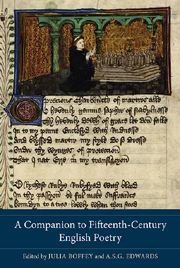Book contents
- Frontmatter
- Contents
- List of Contributors
- List of Abbreviations
- Conventions
- Introduction
- Part I Background and Context
- Part II Authors
- 3 Thomas Hoccleve
- 4 Thomas Hoccleve's Regiment of Princes
- 5 John Lydgate's Major Poems
- 6 John Lydgate's Religious Poetry
- 7 John Lydgate's Shorter Secular Poems
- 8 John Capgrave and Osbern Bokenham: Verse Saints' Lives
- 9 Peter Idley and George Ashby
- 10 John Audelay and James Ryman
- Part III Themes and Genres
- Chronology
- Index of Manuscripts
- General Index
9 - Peter Idley and George Ashby
from Part II - Authors
Published online by Cambridge University Press: 05 July 2013
- Frontmatter
- Contents
- List of Contributors
- List of Abbreviations
- Conventions
- Introduction
- Part I Background and Context
- Part II Authors
- 3 Thomas Hoccleve
- 4 Thomas Hoccleve's Regiment of Princes
- 5 John Lydgate's Major Poems
- 6 John Lydgate's Religious Poetry
- 7 John Lydgate's Shorter Secular Poems
- 8 John Capgrave and Osbern Bokenham: Verse Saints' Lives
- 9 Peter Idley and George Ashby
- 10 John Audelay and James Ryman
- Part III Themes and Genres
- Chronology
- Index of Manuscripts
- General Index
Summary
‘“Al that is writen is writen for our doctrine”, and that is myn entente’, writes Chaucer, quoting Romans 15: 4, and seeking to excuse himself for his ‘translacions and enditynges of worldly vanities’ (CT, X. 1083). But even if this claim were generally true of the Middle Ages, it would also be possible to maintain that some writings are more obviously intended to transmit learning than others. Books of instructional or educational advice, which are the subject of this chapter, are designed to transmit the accumulated wisdom – both bookish and experiential – from one generation to the next. Characteristically, experienced spiritual advisors set out rules for novices; sophisticated political philosophers counsel kings and princes; fathers and mothers instruct their sons and daughters in suitable comportment and behaviour.
The repetitive generality of advice manuals – the conventionality of their sentiments and their heavy dependence on traditional sources, well-known stories, and exempla – have caused them to be held in low modern esteem: they have been called ‘empty’ books. Referring specifically to ‘mirrors for princes’ Judith Ferster explains why – though what she says could as easily apply to other, nonpolitical, types of manuals. It is a view she proceeds to contest interestingly: ‘they are often seen as compilations of platitudes, clichés, and ancient stories so general, so distant in time and place, and so inert that they have no bearing on political concerns contemporary with their writers and translators’ (Ferster 1996: 2).
- Type
- Chapter
- Information
- A Companion to Fifteenth-Century English Poetry , pp. 113 - 126Publisher: Boydell & BrewerPrint publication year: 2013



